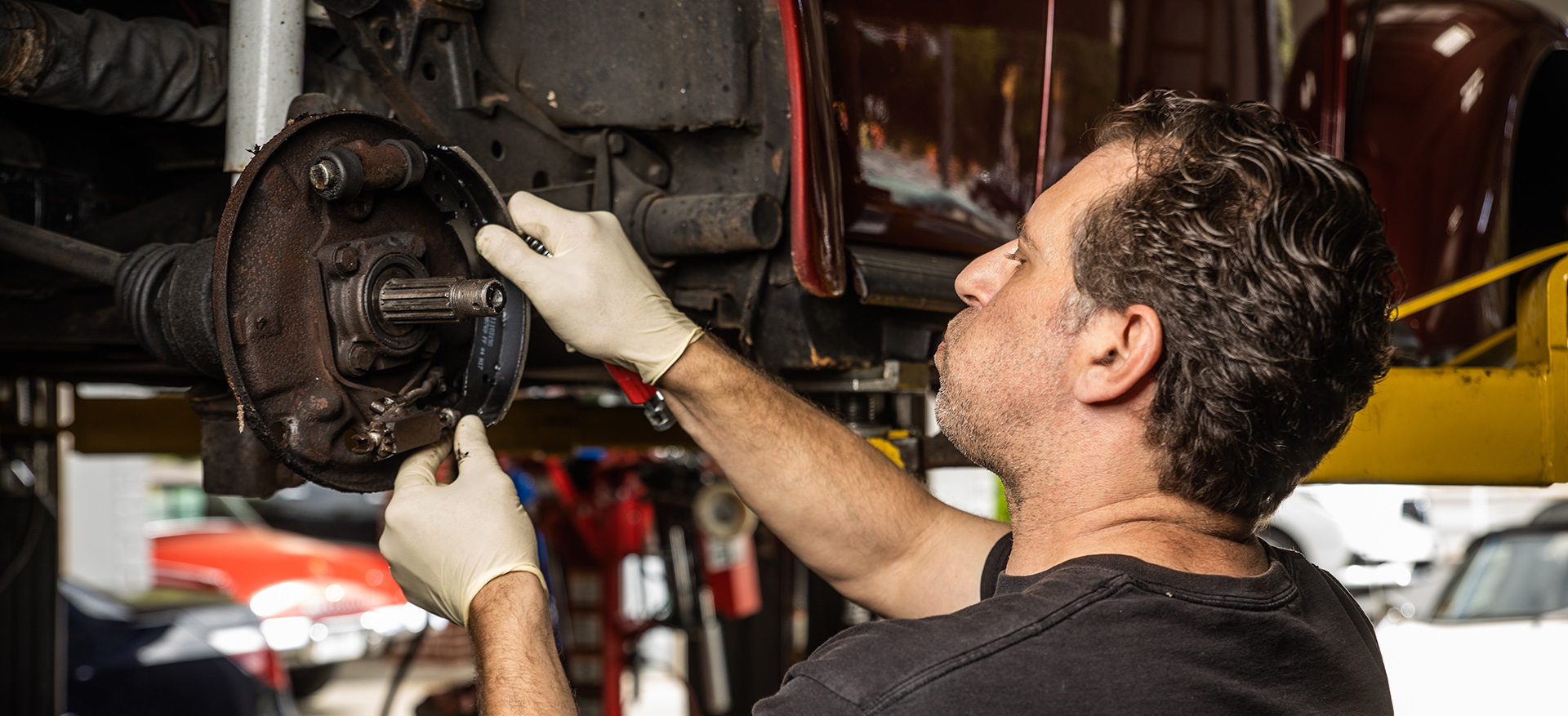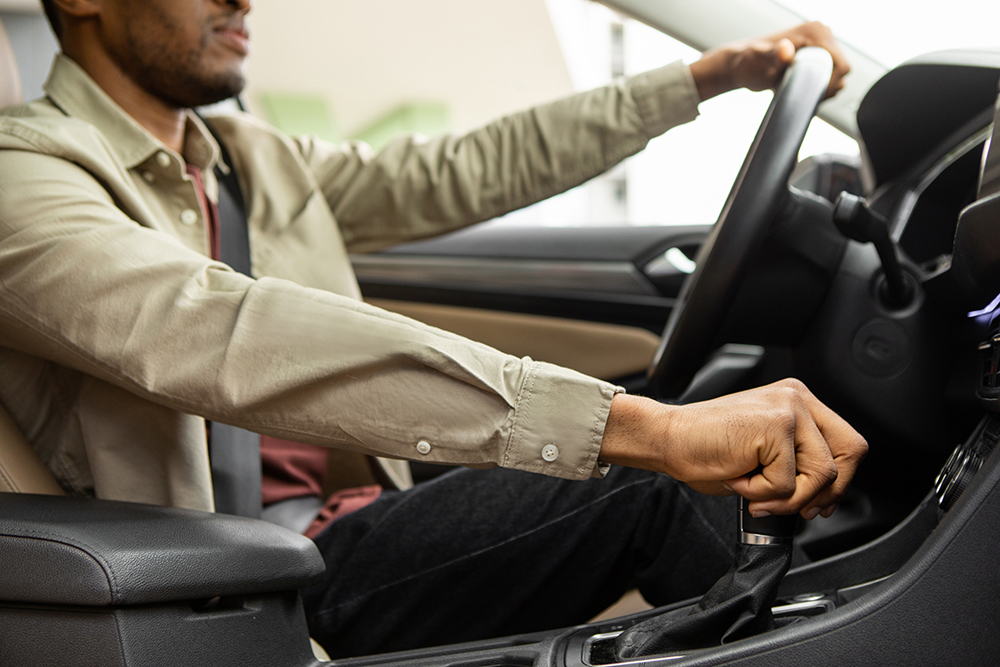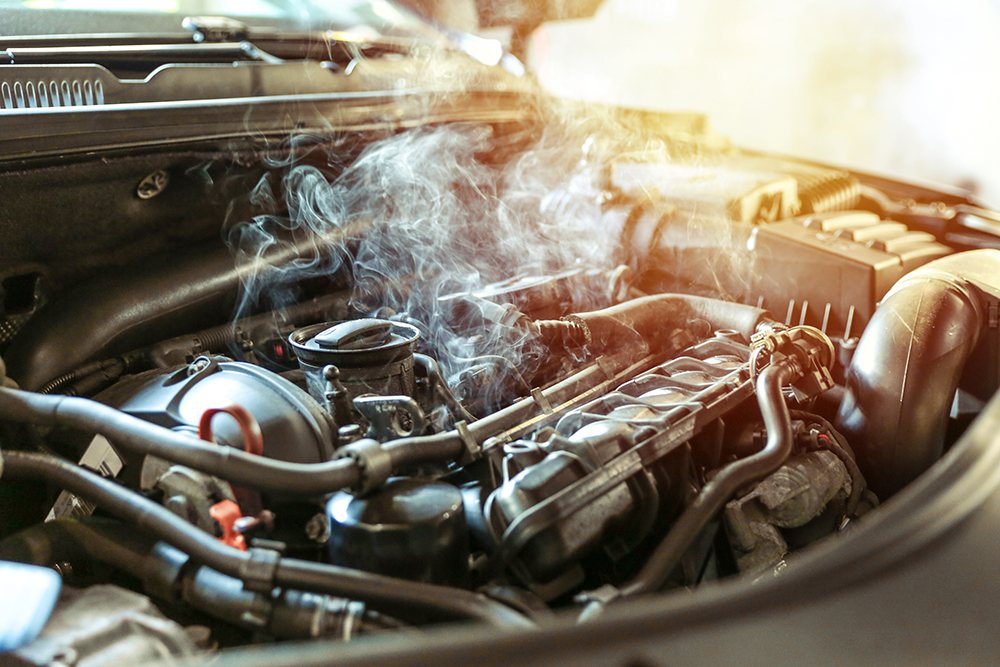Auto repair emergency? We're here to help.
Give us a call, stop by, or have your vehicle towed to a Metro Motor auto repair shop near you. Our emergency car repair centers are staffed with highly skilled automotive mechanics and ASE-trained repair technicians to help you through what we know is a stressful and inconvenient time. Knowing how to handle auto repair emergencies can make a significant difference in the outcome. Metro Motor is here to help.
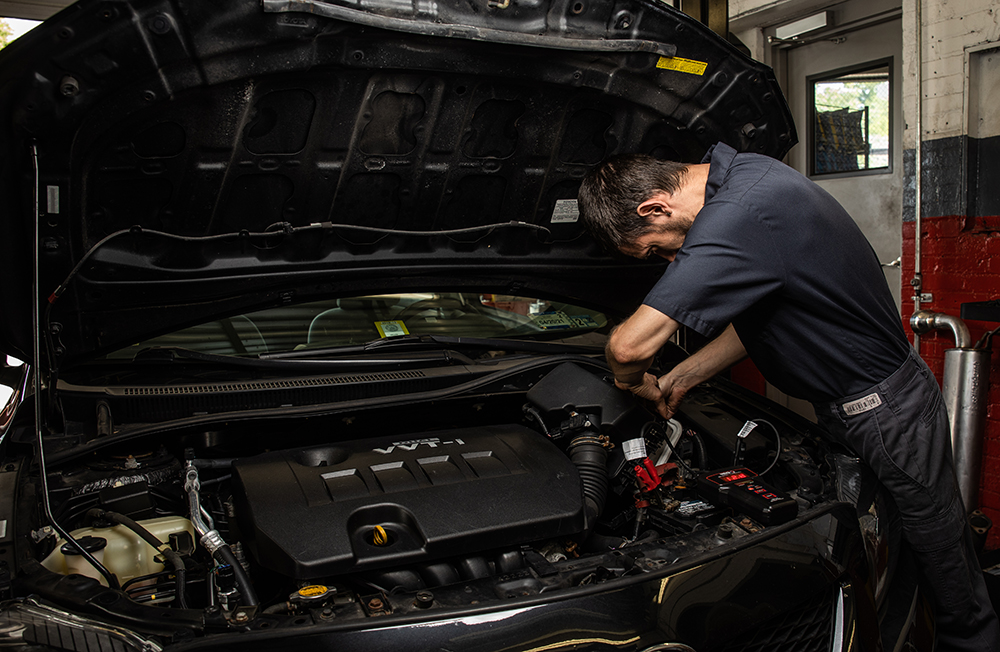
Image: A Metro Motor automotive technician inspects a vehicle brought in for emergency auto repair.
What are common causes of emergency car repair?
Emergency auto repair can result from many “everyday” things that may happen to a car; for instance, damage to struts and suspension from hitting a pothole or a curb, or losing power steering or brakes due to an unchecked fluid leak. Emergency car repair can also become necessary when regular maintenance is put off or overlooked. When this happens, things may spike to an emergency level “all of a sudden” – even if the problem has been building gradually.
If left unattended, many of the systems and interconnected parts of your vehicle may require emergency car maintenance. Vehicle parts wear out, break down, get clogged up, or generally cease to function as they should. In addition to poor performance, your car may become unsafe to drive until the problem is fixed. You should always stay on top of service to these areas, as they are common causes of emergency car repair:
- Lubrication and fuel deposit control
- Belts and hoses
- Brake fluid flush
- Air and fuel induction systems
- Wheel and tire inspection, rotation, and alignment
- Transmission flush
- Cooling system (cools hard-working engine, not passenger area)
- Climate control system (heats and cools passenger area, not the engine)
By staying on top of scheduled maintenance check-ups, you can eliminate or greatly reduce the chances of ever having to deal with the inconvenience, risk, and greater expense of emergency auto repair. Still, it happens. When you need emergency car maintenance, Metro Motor is here to help.
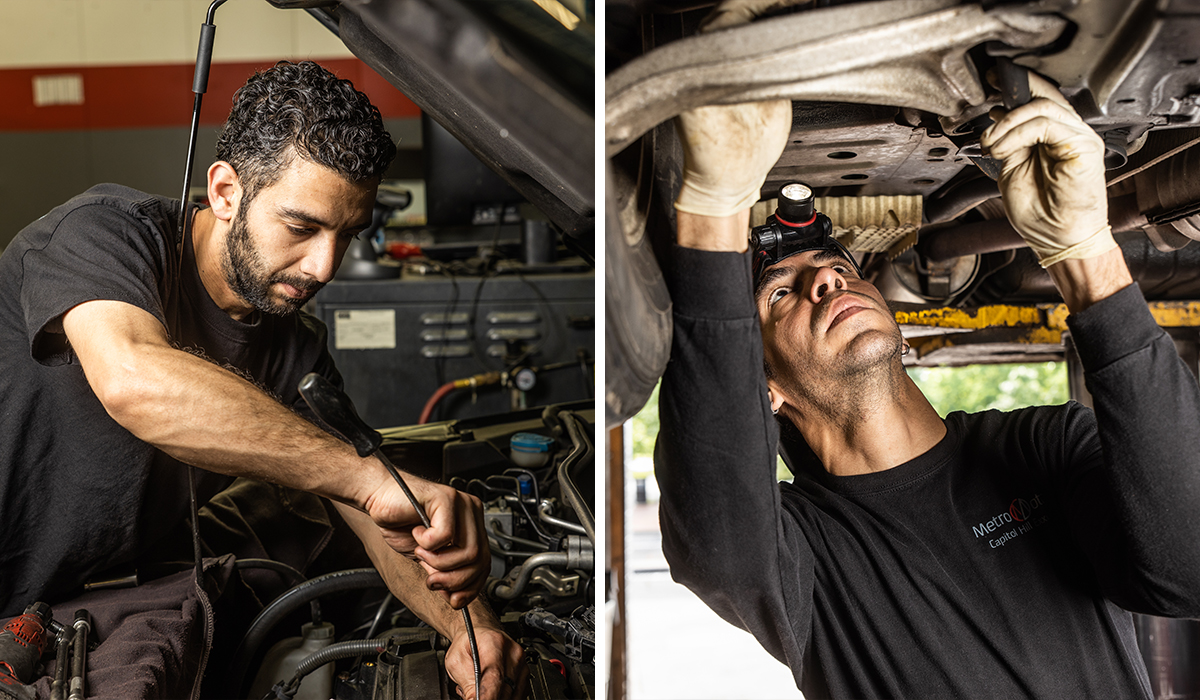
Composite image: Metro Motor automotive technicians work on vehicles requiring emergency auto repair.
What should you do in an auto repair emergency?
Whether it’s a sudden breakdown on the highway or an unexpected mechanical failure in your driveway, being prepared and informed is key. Metro Motor is here to help guide you through common auto repair emergencies, how to respond to them, and tips for preventing these situations in the future.
Flat Tires
A flat tire can happen anywhere, often without warning. Causes can include punctures from road debris, a blowout due to underinflation, or gradual wear and tear. Here's what you should do:
- Pull Over Safely: If you're driving, find a safe spot to pull over, away from traffic.
- Use Hazard Lights: Turn on your hazard lights to alert other drivers.
- Change the Tire: If you have a spare tire and the necessary tools, you can change the tire yourself. Otherwise, call for roadside assistance.
Dead Battery
A dead battery can leave you stranded, unable to start your car. This can result from leaving the lights on, extreme weather conditions, or an old battery. In situations like these:
- Jump Start the Battery: Use jumper cables and another vehicle to jump-start your car. Make sure to follow the correct procedure to avoid damage.
- Call for Assistance: If jump-starting doesn’t work, you may need a new battery or professional help. Roadside assistance can be there in a jiffy.
Overheating Engine
An overheating engine is a serious issue that can cause significant damage if not addressed promptly. Common causes include coolant leaks, a malfunctioning thermostat, or a broken water pump.
- Turn Off AC & Turn On Heater: This can help reduce the engine temperature.
- Pull Over & Let Engine Cool: Never attempt to open the radiator cap while the engine is hot.
- Check Coolant Levels: If you have coolant, you can add it once the engine has cooled. If not, call for roadside assistance. If the problem is severe, your vehicle may have to be towed to an auto repair shop.
Brake Failure
Brake failure is a terrifying experience and can be caused by brake fluid leaks, worn brake pads, or mechanical issues. If you find yourself with malfunctioning brakes:
- Pump the Brakes: Try pumping the brakes to build up brake fluid pressure.
- Use the Emergency Brake: Engage the emergency brake gradually to slow down.
- Downshift: If you have a manual transmission, downshift to lower gears to help slow the vehicle.
- Find a Safe Place to Stop: Pull over as soon as possible and call for help. Do not attempt to drive the vehicle again. Your car should be towed to an auto mechanic.
Transmission Failure
Transmission issues can prevent your car from shifting gears properly, leading to loss of control and power.
- Pull Over Safely: If you notice transmission problems, pull over safely.
- Do Not Drive: Continuing to drive with a faulty transmission can cause further damage.
- Call for Towing: Contact a towing service to transport your vehicle to a repair shop.
In situations like these, the skilled emergency car repair mechanics at Metro Motor are here to help. With our fleet of towing and roadside assistance vehicles, we can get you and your car safely out of harm's way and into the nearest emergency auto repair shop. Metro Motor employs ASE-certified professionals that meet the industry’s highest standards for emergency auto repair service, diagnosis, and emergency car maintenance. We’ll find out what’s wrong, discuss it with you, and then take care of your vehicle repair right away. Your peace of mind, safety, and complete satisfaction is our goal.
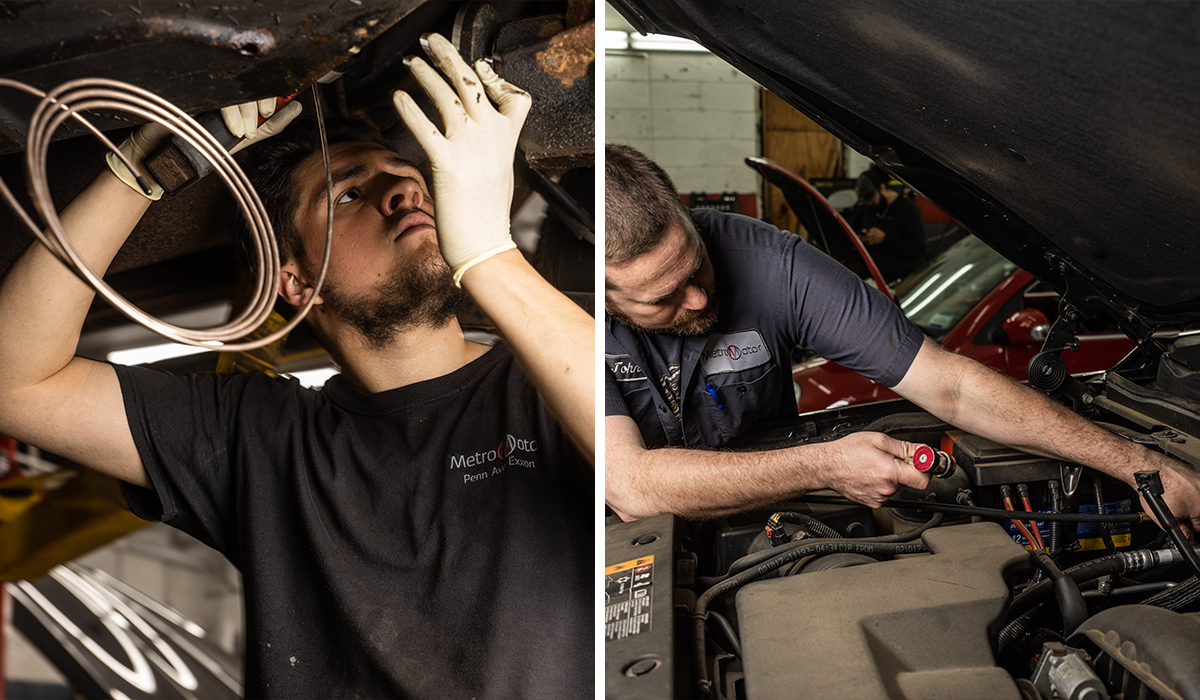
Composite image: Metro Motor automotive technicians work on vehicles requiring emergency auto repair.

For the life of the vehicle...
When you invest in high-quality BG maintenance, your vehicle’s systems are covered by BG. The complimentary Lifetime BG Protection Plan® covers seven major systems: fuel, engine, transmission, driveline, cooling, power steering, and brakes.
Learn how to prevent auto repair emergencies.
While some emergencies are unavoidable (we're looking at you, came-out-of-nowhere pothole), regular maintenance and proactive measures can reduce the likelihood of unexpected breakdowns.
- Regular Inspections | Have your vehicle inspected regularly by a professional mechanic. Check fluid levels, tire pressure, and battery health frequently.
- Follow Maintenance Schedules | Adhere to your vehicle’s recommended maintenance schedule, including oil changes, brake inspections, and tire rotations.
- Be Prepared | Keep an emergency kit in your car, including jumper cables, a spare tire, a jack, basic tools, and emergency contact numbers.
- Listen to Your Car | Pay attention to unusual noises, warning lights, and changes in performance. Address issues promptly before they become emergencies.
Auto repair emergencies can be daunting, but being prepared and knowing how to respond can make all the difference. By understanding common emergencies, taking preventative measures, and staying calm under pressure, you can navigate these situations more effectively. Always remember, safety comes first – when in doubt, seek professional help to ensure the best outcome for you and your vehicle. Contact your nearest Metro Motor auto repair shop to get your vehicle running like new again.
Keep exploring.
![]()
Request
Service

